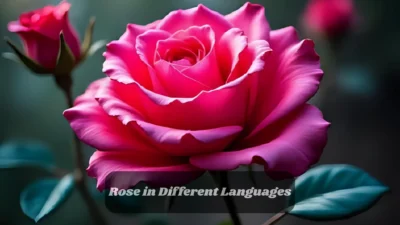Why Are People Searching for “Bear” in Different Languages?
The bear is a powerful symbol in many cultures, representing strength, courage, and nature’s majesty. Whether you are interested in wildlife, storytelling, or simply want to learn new words for fun or travel, knowing how to say “bear” in different languages can be very useful. This article will help you understand the meaning of “bear,” provide easy pronunciations, and give example sentences so you can use the word confidently wherever you go.
How to Say “Bear” in 70 Different Languages
- English (🇺🇸) – Bear | Pronunciation: bear
“The bear roams the forest.” - Spanish (🇪🇸) – Oso | Pronunciation: oh-so
“El oso vive en el bosque.” - French (🇫🇷) – Ours | Pronunciation: oors
“L’ours est un animal fort.” - German (🇩🇪) – Bär | Pronunciation: bair
“Der Bär schläft im Winter.” - Italian (🇮🇹) – Orso | Pronunciation: or-so
“L’orso è grande.” - Japanese (🇯🇵) – 熊 (Kuma) | Pronunciation: koo-ma
“熊は森にいます。” - Chinese (🇨🇳) – 熊 (Xióng) | Pronunciation: shyong
“熊在森林里。” - Russian (🇷🇺) – Медведь (Medved’) | Pronunciation: med-vyed
“Медведь живёт в лесу.” - Arabic (🇸🇦) – دب (Dubb) | Pronunciation: doob
“الدب يعيش في الغابة.” - Hindi (🇮🇳) – भालू (Bhalu) | Pronunciation: bha-loo
“भालू जंगल में रहता है।” - Korean (🇰🇷) – 곰 (Gom) | Pronunciation: gom
“곰이 숲에 산다.” - Portuguese (🇵🇹) – Urso | Pronunciation: oor-so
“O urso é um animal grande.” - Turkish (🇹🇷) – Ayı | Pronunciation: ah-yuh
“Ayı ormanda yaşar.” - Dutch (🇳🇱) – Beer | Pronunciation: bair
“De beer leeft in het bos.” - Swedish (🇸🇪) – Björn | Pronunciation: byurn
“Björn bor i skogen.” - Greek (🇬🇷) – Αρκούδα (Arkóuda) | Pronunciation: ar-koo-dah
“Η αρκούδα ζει στο δάσος.” - Swahili (🇰🇪) – Dubu | Pronunciation: doo-boo
“Dubu anaishi msituni.” - Hebrew (🇮🇱) – דוב (Dov) | Pronunciation: dohv
“הדוב גר ביער.” - Filipino (🇵🇭) – Oso | Pronunciation: oh-so
“Ang oso ay malaki.” - Vietnamese (🇻🇳) – Gấu | Pronunciation: gow
“Gấu sống trong rừng.” - Maori (🇳🇿) – Peepi | Pronunciation: peh-eh-pee
“Ko te peepi e noho ana i te ngahere.” - Bengali (🇧🇩) – ভালুক (Bhaluk) | Pronunciation: bha-luk
“ভালুক বনে থাকে।” - Polish (🇵🇱) – Niedźwiedź | Pronunciation: nyeh-djv-yej-dj
“Niedźwiedź mieszka w lesie.” - Finnish (🇫🇮) – Karhu | Pronunciation: kar-hoo
“Karhu asuu metsässä.” - Romanian (🇷🇴) – Urs | Pronunciation: oors
“Ursul trăiește în pădure.” - Hungarian (🇭🇺) – Medve | Pronunciation: med-veh
“A medve az erdőben él.” - Czech (🇨🇿) – Medvěd | Pronunciation: med-vyed
“Medvěd žije v lese.” - Indonesian (🇮🇩) – Beruang | Pronunciation: buh-roo-ang
“Beruang hidup di hutan.” - Thai (🇹🇭) – หมี (Mee) | Pronunciation: mee
“หมีอยู่ในป่า.” - Latvian (🇱🇻) – Lācis | Pronunciation: lah-tsis
“Lācis dzīvo mežā.” - Ukrainian (🇺🇦) – Ведмідь (Vedmid’) | Pronunciation: ved-meed
“Ведмідь живе в лісі.” - Bulgarian (🇧🇬) – Мечка (Mechka) | Pronunciation: mechk-ah
“Мечката живее в гората.” - Serbian (🇷🇸) – Медвед (Medved) | Pronunciation: med-ved
“Медвед живи у шуми.” - Croatian (🇭🇷) – Medvjed | Pronunciation: med-vyed
“Medvjed živi u šumi.” - Slovak (🇸🇰) – Medveď | Pronunciation: med-vyed
“Medveď žije v lese.” - Lithuanian (🇱🇹) – Lokys | Pronunciation: loh-kis
“Lokys gyvena miške.” - Estonian (🇪🇪) – Karu | Pronunciation: kah-roo
“Karu elab metsas.” - Icelandic (🇮🇸) – Björn | Pronunciation: byurn
“Björn býr í skógi.” - Maltese (🇲🇹) – Ors | Pronunciation: ors
“L-ors jgħix fil-foresta.” - Irish (🇮🇪) – Béar | Pronunciation: bear
“Tá an béar sa choill.” - Welsh (🏴) – Arth | Pronunciation: arth
“Mae’r arth yn y coedwig.” - Catalan (🇪🇸) – Ós | Pronunciation: ohs
“L’ós viu al bosc.” - Basque (🇪🇸) – Hartz | Pronunciation: hartz
“Hartzak basoan bizi dira.” - Galician (🇪🇸) – Oso | Pronunciation: oh-so
“O oso vive no bosque.” - Corsican (🇫🇷) – Orsu | Pronunciation: or-soo
“L’orsu campa in u boscu.” - Luxembourgish (🇱🇺) – Bär | Pronunciation: bair
“De Bär liewt am Bësch.” - Belarusian (🇧🇾) – Мядзведзь (Myadzvedz’) | Pronunciation: myad-zvyedz
“Мядзведзь жыве ў лесе.” - Azerbaijani (🇦🇿) – Ayı | Pronunciation: ah-yuh
“Ayı meşədə yaşayır.” - Georgian (🇬🇪) – დათვი (Datvi) | Pronunciation: daht-vee
“დათვი ტყეში ცხოვრობს.” - Armenian (🇦🇲) – արջ (Arj) | Pronunciation: arj
“Արջը ապրում է անտառում։” - Kurdish (🇮🇶) – Hêşîn | Pronunciation: hay-sheen
“Hêşîn di daristanê de dijî.” - Pashto (🇦🇫) – بېړۍ (Bary) | Pronunciation: bah-ree
“بېړۍ په ځنګل کې ژوند کوي.” - Dari (🇦🇫) – خرس (Khers) | Pronunciation: khers
“خرس در جنگل زندگی میکند.” - Nepali (🇳🇵) – भालु (Bhalu) | Pronunciation: bha-loo
“भालु जंगलमा बस्छ।” - Sinhala (🇱🇰) – වැලි (Weli) | Pronunciation: we-li
“වැලි වනවල ජීවත් වේ.” - Tamil (🇮🇳) – கரடி (Karadi) | Pronunciation: ka-ra-di
“கரடி காடுகளில் வாழ்கிறது.” - Telugu (🇮🇳) – రీడును (Reedunu) | Pronunciation: ree-doo-noo
“రీడు అरण్యంలో నివసిస్తుంది.” - Kannada (🇮🇳) – ಕರಡಿ (Karadi) | Pronunciation: ka-ra-di
“ಕರಡಿ ಕಾಡಿನಲ್ಲಿ ವಾಸಿಸುತ್ತಿದೆ.” - Malayalam (🇮🇳) – കരടി (Karadi) | Pronunciation: ka-ra-di
“കരടി കാട്ടിൽ ആണ്.” - Marathi (🇮🇳) – अस्वल (Asval) | Pronunciation: us-val
“अस्वल जंगलात राहतो.” - Gujarati (🇮🇳) – ભાળુ (Bhalu) | Pronunciation: bha-lu
“ભાળુ જંગલમાં રહે છે.” - Punjabi (🇮🇳) – ਰਿੱਛ (Ritchh) | Pronunciation: ritchh
“ਰਿੱਛ ਜੰਗਲ ਵਿੱਚ ਰਹਿੰਦਾ ਹੈ।” - Uzbek (🇺🇿) – Ayiq | Pronunciation: ah-yik
“Ayiq o‘rmonlarda yashaydi.” - Kazakh (🇰🇿) – Аю (Ayu) | Pronunciation: ah-yoo
“Аю орманда тұрады.” - Turkmen (🇹🇲) – Aýy | Pronunciation: ah-yuh
“Aýy tokaýda ýaşaýar.” - Mongolian (🇲🇳) – Баавгай (Baavgai) | Pronunciation: baa-v-guy
“Баавгай ойд амьдардаг.” - Lao (🇱🇦) – ຫີ້ (Hii) | Pronunciation: hee
“ຫີ້ຢູ່ໃນປ່າ.” - Burmese (🇲🇲) – ကျား (Kyar) | Pronunciation: kya
“ကျားသည် တောထဲတွင်နေထိုင်သည်။” - Malagasy (🇲🇬) – Orsa | Pronunciation: or-sa
“Ny orsa dia mipetraka ao anaty ala.” - Haitian Creole (🇭🇹) – Lous | Pronunciation: loos
“Lous la ap viv nan forè a.”
🐻 Final Thought
No matter the language, the word “bear” always symbolizes strength and wonder in nature.




